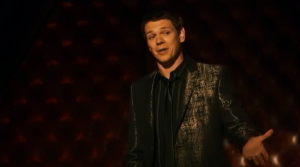“There are people in this world who deal only in extremes. It’s naive to think that anything less than extreme measures will stop them.” – Amanda Waller, Arrow
Call it a fitting coincidence, call it good timing, but the Arrow episode, “The Brave and the Bold,” provided an unintentional precursor to the debate the U.S. is currently having about torture after the CIA report summary from the U.S. Senate Intelligence Committee released to the public on Tuesday.
Arrow does an excellent job with Amanda Waller’s character. She is not a hero in the traditional sense and often blurs the line between anti-hero and villain in the comics. However, in the New 52 version of Waller and in the show, she is a well-intentioned extremist who acts on her perception of the greater good.
Personally, this is my favorite version of Amanda Waller. There is more complexity to this character. Ultimately, she acts on what she believes is the greater good. She makes difficult choices that are, at times, morally shady; her character is even amoral. She cannot concern herself with what is and isn’t moral. For Waller, it is about the big picture — the greater good.
“The Brave and the Bold” explores the contrast between the type of hero Barry Allen/The Flash is and the type of hero (or anti-hero) Oliver Queen/The Arrow is. The question both men have to look inside themselves to answer is, what makes a true hero? And, what kind of hero does the world really need?
Allen is the archetypical hero. He believes there is a moral line that cannot, under any circumstances, be crossed or sacrificed even for the greater good. Arrow, as well as ARGUS agents and Waller, believe that to deal with the extreme, extreme measures are necessary — including torture to get information.
Arrow believes that by going to these extremes, he has sacrificed his humanity, but that is a necessary sacrifice to achieve the greatest good.
Is the United States not reflecting on a similar question right now? Instead of asking what hero we are going to be, we are asking what role we should be playing in the world and how much of who we are we are willing to sacrifice in pursuit of our enemies.
The U.S. was founded on the principles of due process and equal protection under the law. Due process applies to everyone — not just citizens. Nowhere in the U.S. Constitution, either in the Fifth Amendment or the Fourteenth Amendment, does it say that only citizens are entitled to due process.
The Fifth Amendment says, “no person shall be . . . deprived of life, liberty, or property without due process of law.” The Fourteenth Amendment says, “…nor shall any state deprive any person of life, liberty, or property, without due process of law.” Not just citizens… any person.
After reading some of the tactics used by the CIA to interrogate suspects, there are incidents of cruel and unusual punishment, which of course is in violation of the Eighth Amendment.
After September 11, 2001, we entered uncertain times. We were willing to go to war to fight terrorism. We were willing to go to extremes, and we adopted the very mentality that Amanda Waller has about fighting extremism. We were chasing people who only deal in extremes and we concluded that it was foolish to think anything, but extreme measures would produce results.
But in doing so, we forsook the very principles this nation was founded on. We violated our own laws and we turned our backs on any concept of right and wrong. Torture is wrong. There is no debate here. The only debate we can have is what role we want to have in the world — what image do we want to have?
Are we willing to sacrifice who we are — what makes us different from our enemies? Or, are we going to be the moral standard-bearer, the example that no matter how extreme the enemy is, we will not sacrifice who we are in our response to them?

